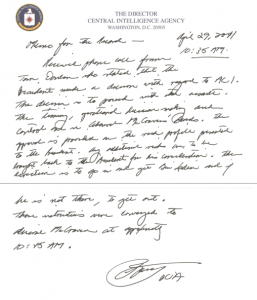GOP Targets John Brennan and Leon Panetta with Leak Witchhunts
Meanwhile, speaking of leak investigations, the GOP has gone leak investigation happy.
First, Peter King wrote Robert Mueller formally requesting an investigation into the leak about the UndieBomber. He appears to have cleaned up his single-minded focus on reporters who were mean to Ray Kelly, focusing now on the “penetration of Al Qaeda in the Arabian Peninsula” rather than the initial reporting on the “plot” itself.
I am writing to formally request (a) that the Federal Bureau of Investigation conduct a full inquiry of the widely reported leaks earlier this month of highly classified information regarding penetration of Al Qaeda in the Arabian Peninsula (AQAP) and (b) that this investigation include the Intelligence Community, the Department of Defense, the Department of Homeland Security, federal law enforcement and the White House, including the National Security staff.
Among the severely disturbing implications of these leaks are that (a) the lives of a unique intelligence source and others may have been jeopardized, (b) the operation had to be aborted before its potential was maximized and (c) critical intelligence relationships have been damaged.
The information regarding this intelligence matter was handled in the most restricted manner possible by the Intelligence Community and the White House which means the leak would have to have emanated from a small universe. That makes this leak all the more distressing and is why I so strongly believe that an investigation of a security breach of this magnitude must encompass everyone who had access to this vital information. [my empahsis]
But he seems to ignore the likelihood that foreign sources were the people–in addition to John Brennan—who revealed the plot involved a Saudi-managed infiltrator.
Nevertheless, it appears clear that Brennan might be included among the targets here.
Meanwhile, Representative Tom Price included an amendment in the 2013 NDAA that mandates an investigation into leaks preventing Israel’s efforts to drag us into an attack on Iran.
A stream of highly sensitive information continues to be leaked to the press–information that includes U.S. and Israeli military and intelligence operational capabilities, as well as classified negotiations between Israel and other countries.
On March 20, The New York Times, citing senior administration officials, reported the conclusions of a classified war simulation conducted by the United States that analyzed an Israeli attack on Iranian nuclear facilities.
On March 28, Foreign Policy magazine, quoting four senior diplomats and military intelligence officers, referred to a report that Israel would be granted access to air bases in Azerbaijan as part of an attack on Iran’s nuclear facilities, a move clearly designed to undercut cooperation between Azerbaijan and Israel.
Further degrading Israel’s ability to defend itself, The Washington Post’s David Ignatius on February 3 reported that Secretary of Defense Leon Panetta believes there’s a strong likelihood that Israel will strike Iran in April, May, or June, which reportedly sent Iran’s air defenses on high alert.
The release of this classified information not only puts at risk fragile negotiations between countries but also the very lives of the men and women called upon to carry out this mission. I recently traveled to the Middle East, where we met with senior Israeli officials. Their number one concern was that for the first time in our long relationship, United States was releasing classified operational information and capabilities, willfully putting at risk the lives of Israeli people. [links added to the stories named by Price]
Now, I’d say this amendment wouldn’t make it through the Senate given that it attempts to criminalize leaks supporting US interests, except that it passed by an overwhelming margin in the House and AIPAC has as much sway among the Democrats who set the schedule in the Senate as it does in the House.
But it’s worth noting that it names Panetta explicitly for his blabbing to David Ignatius.
I’ve noted that both Brennan and Panetta might catch some heat for these leaks. But it almost certainly won’t be legal trouble. The latter, at least, certainly served Administration efforts to stave off an Israeli attack. And Obama seems to have protected all the other leaking Brennan as done.
Still, these leak investigations, if they happen, do offer the GOP a way to pressure the Administration during the election season.
I’m frankly opposed to anything that helps Mitt and his wingnut advisors get closer to the White House. Still, I admit a bit of schadenfreude that the Administration will soon be the focus of the kind of witchhunts it has launched against others.

